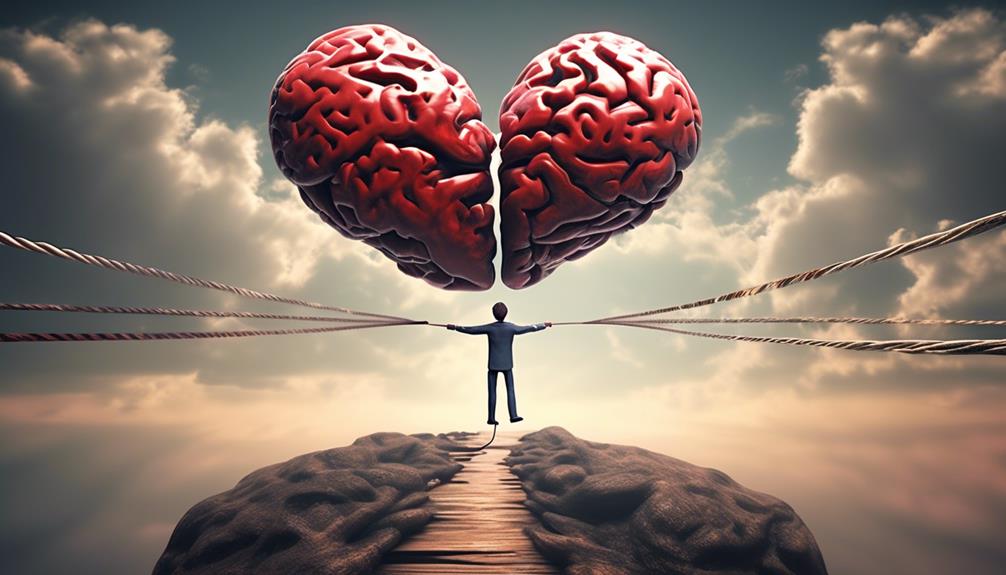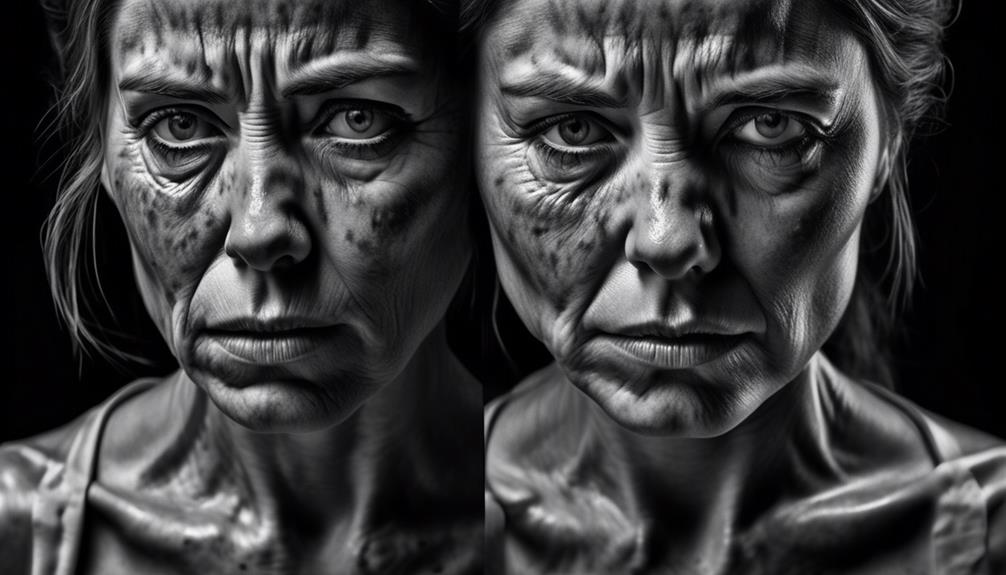In my opinion, dealing with the challenges of Borderline Personality Disorder (BPD) while also facing an addiction to love has helped me see the delicate balance between handling emotional turmoil and finding comfort in close relationships.
The intertwining of these two challenges can manifest in ways that impact not only the individual but also those around them. Understanding the roots of this connection is essential, as it can offer a path to unraveling the intricate threads of one's emotional landscape.
Through exploration and insight, a journey towards healing and self-discovery awaits those willing to embark on this introspective voyage.
Key Takeaways
- BPD individuals seek validation through intense relationships for self-worth.
- Love addiction leads to dependency on partners for reassurance.
- Recognizing patterns and emotional dependencies is crucial for addressing love addiction.
- Coping strategies involve therapy, mindfulness, setting boundaries, and seeking professional help.
Understanding Borderline Personality Disorder
Understanding Borderline Personality Disorder involves recognizing the complex interplay of symptoms such as intense fear of abandonment, emotional instability, and rapid mood fluctuations. Individuals with BPD often experience an overwhelming fear of being abandoned by those they're close to, leading to desperate attempts to avoid real or perceived rejection. This fear can trigger behaviors associated with love addiction, where individuals become overly reliant on their partners for validation and a sense of self-worth.
Love addiction in BPD can manifest as an intense need for constant reassurance and attention from their partners, often leading to emotionally turbulent relationships. The individual's sense of self is closely tied to their partner's approval, making them vulnerable to manipulation and dependency. This pattern of behavior can result in a cycle of seeking out intense relationships to fill the emotional void within themselves. Understanding these dynamics is crucial in providing effective therapeutic interventions to help individuals with BPD navigate their relationships in healthier ways.
Recognizing Love Addiction Patterns

Recognizing love addiction patterns involves acknowledging the deep-rooted emotional dependencies that can drive individuals with BPD towards seeking validation and fulfillment from their relationships. When identifying these patterns, it's crucial to consider the following:
- Seeking love as a remedy for past emotional pain can create a cycle of dependence and validation-seeking behaviors.
- Craving emotional connection intensely may lead to obsession, anxiety, and an overwhelming fear of abandonment in individuals with BPD.
- Using love as an escape from inner turmoil can result in entering destructive relationships that hinder personal growth and healing.
- Love addiction can provide a temporary illusion of fulfillment, perpetuating the cycle of seeking external validation while neglecting one's own emotional needs.
Impact of Bpd on Relationships
BPD impacts relationships by fostering an environment of instability due to intense mood swings and fear of abandonment. Individuals with BPD often experience intense fear of being abandoned, leading to behaviors that can strain relationships. This fear can manifest in clinginess, jealousy, or pushing others away before they've the chance to leave.
Moreover, the unstable sense of self that's characteristic of BPD can make it challenging for individuals to maintain healthy boundaries in relationships. This lack of a solid self-identity can result in difficulties trusting others, heightened sensitivity to rejection, and an overall feeling of emptiness that they may seek to fill through relationships. These factors contribute to a cycle of intense emotions and behaviors that can negatively impact relationship dynamics.
Understanding these aspects of BPD is crucial in navigating and addressing the challenges it presents in interpersonal relationships.
Coping Strategies for Bpd and Love Addiction

To effectively manage love addiction in individuals with BPD, implementing coping strategies such as mindfulness practices and therapy is crucial. It's essential to address the underlying mental health challenges faced by someone with BPD while also tackling the patterns of love addiction.
Here are some key coping strategies:
- Engage in mindfulness practices to stay present and reduce impulsive behaviors associated with love addiction in BPD.
- Seek individual therapy to address underlying emotional wounds and learn healthy coping mechanisms for managing love addiction.
- Practice setting boundaries in relationships to prevent codependency and foster self-reliance while managing BPD and love addiction.
- Develop a support network of trusted individuals who understand BPD and love addiction to provide guidance and emotional support.
Seeking Support and Treatment
Seeking professional assistance for individuals struggling with co-occurring Borderline Personality Disorder (BPD) and love addiction is crucial for effective treatment and recovery. Therapy plays a central role in addressing these issues.
Individual therapy can help individuals work through personal issues and emotional needs, while couples therapy, particularly when combined with dialectical behavior therapy, can assist in managing relationship dynamics and overcoming love addiction.
Specialized therapists experienced in treating BPD and love addiction can offer tailored treatment options that cater to the specific needs of each individual. Treatment approaches may include a combination of medication, psychotherapy, and support groups to address emotional wounds and promote self-love.
Ultimately, seeking professional diagnosis and treatment for BPD and love addiction is essential for individuals to learn how to navigate healthy relationships and lead fulfilling lives. By accessing the right support and treatment, individuals can work towards healing and growth in both their personal and relational lives.
Frequently Asked Questions
Are BPD Love Addicts?
Yes, individuals with BPD can exhibit behaviors associated with love addiction. This pattern involves seeking intense emotional connections to cope with past traumas and insecurities. It can lead to unstable relationships and emotional distress.
Understanding this aspect of BPD is crucial for effective intervention and support. By addressing underlying issues and promoting healthy coping mechanisms, individuals with BPD can work towards healthier relationship dynamics and emotional well-being.
Do People With BPD Crave Love?
We all crave love in some form or another. It's a universal desire that drives us to seek connections and build relationships. Love fulfills our emotional needs, provides support, and gives us a sense of belonging.
This longing for love is intrinsic to our human nature, shaping our interactions and shaping our lives. Love is the foundation upon which we build our relationships, nurturing our souls and enriching our experiences.
Do People With BPD Feel Love More Intensely?
Yes, individuals with BPD do feel love more intensely. This heightened emotional sensitivity can lead to intense experiences of love, where emotions are magnified and fluctuate rapidly.
These intense feelings can result in idealizing partners one moment and devaluing them the next, contributing to challenges in maintaining stable and healthy relationships.
The fear of abandonment and emotional dysregulation common in BPD can further amplify the intensity of love experienced.
Why Do Borderlines Hurt the Ones They Love?
We hurt loved ones due to intense fear of abandonment and emotional instability. Mood swings and lack of a strong sense of self play a role.
Severe anger or sadness can lead to unintentional harm during emotional outbursts. Self-medicating with destructive behaviors also contributes to hurting those close.
Struggles with emotion regulation and maintaining stable relationships are key factors. These challenges make it difficult to prevent unintentional harm to loved ones.
Conclusion
In conclusion, navigating the intersection of BPD and love addiction requires introspection and self-awareness. Like a tangled web, untangling the complexities of these emotional struggles takes time, patience, and dedication.
By addressing the root causes of our pain and learning healthier coping mechanisms, we can break free from destructive relationship patterns and cultivate a sense of inner peace. Remember, just as a spider weaves a new web, we too can rebuild and strengthen our emotional well-being.









